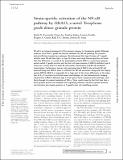| dc.contributor.author | Rosowski, Emily Elizabeth | |
| dc.contributor.author | Lu, Diana | |
| dc.contributor.author | Julien, Lindsay | |
| dc.contributor.author | Rodda, Lauren B. | |
| dc.contributor.author | Gaiser, Rogier A. | |
| dc.contributor.author | Saeij, Jeroen | |
| dc.contributor.author | Jensen, Kirk D. | |
| dc.date.accessioned | 2011-08-26T20:12:55Z | |
| dc.date.available | 2011-08-26T20:12:55Z | |
| dc.date.issued | 2011-01 | |
| dc.date.submitted | 2010-04 | |
| dc.identifier.issn | 0022-1007 | |
| dc.identifier.issn | 1540-9538 | |
| dc.identifier.uri | http://hdl.handle.net/1721.1/65419 | |
| dc.description.abstract | NF-κB is an integral component of the immune response to Toxoplasma gondii. Although evidence exists that T. gondii can directly modulate the NF-κB pathway, the parasite-derived effectors involved are unknown. We determined that type II strains of T. gondii activate more NF-κB than type I or type III strains, and using forward genetics we found that this difference is a result of the polymorphic protein GRA15, a novel dense granule protein which T. gondii secretes into the host cell upon invasion. A GRA15-deficient type II strain has a severe defect in both NF-κB nuclear translocation and NF-κB–mediated transcription. Furthermore, human cells expressing type II GRA15 also activate NF-κB, demonstrating that GRA15 alone is sufficient for NF-κB activation. Along with the rhoptry protein ROP16, GRA15 is responsible for a large part of the strain differences in the induction of IL-12 secretion by infected mouse macrophages. In vivo bioluminescent imaging showed that a GRA15-deficient type II strain grows faster compared with wild-type, most likely through its reduced induction of IFN-γ. These results show for the first time that a dense granule protein can modulate host signaling pathways, and dense granule proteins can therefore join rhoptry proteins in T. gondii’s host cell–modifying arsenal. | en_US |
| dc.description.sponsorship | American Heart Association (Scientist Development Grant 0835099N) | en_US |
| dc.description.sponsorship | Massachusetts Life Sciences Center | en_US |
| dc.description.sponsorship | Singapore. Agency for Science, Technology and Research | en_US |
| dc.description.sponsorship | National Institutes of Health (U.S.) (AI080621) | en_US |
| dc.description.sponsorship | Cleo and Paul Schimmel Foundation | en_US |
| dc.description.sponsorship | Cancer Research Institute (New York, N.Y.) | en_US |
| dc.language.iso | en_US | |
| dc.publisher | Rockefeller University Press | en_US |
| dc.relation.isversionof | http://dx.doi.org/10.1084/jem.20100717 | en_US |
| dc.rights | Creative Commons Attribution-Non-Commercial-Share Alike 3.0 | en_US |
| dc.rights.uri | http://creativecommons.org/licenses/by-nc-sa/3.0/ | en_US |
| dc.source | Rockefeller | en_US |
| dc.title | Strain-specific activation of the NF-kappa B pathway by GRA15, a novel Toxoplasma gondii dense granule protein | en_US |
| dc.type | Article | en_US |
| dc.identifier.citation | Rosowski, E. E. et al. “Strain-specific Activation of the NF- B Pathway by GRA15, a Novel Toxoplasma Gondii Dense Granule Protein.” Journal of Experimental Medicine 208.1 (2011) : 195-212. | en_US |
| dc.contributor.department | Massachusetts Institute of Technology. Department of Biology | en_US |
| dc.contributor.approver | Saeij, Jeroen | |
| dc.contributor.mitauthor | Rosowski, Emily Elizabeth | |
| dc.contributor.mitauthor | Lu, Diana | |
| dc.contributor.mitauthor | Julien, Lindsay | |
| dc.contributor.mitauthor | Rodda, Lauren B. | |
| dc.contributor.mitauthor | Gaiser, Rogier A. | |
| dc.contributor.mitauthor | Jensen, Kirk D. C. | |
| dc.contributor.mitauthor | Saeij, Jeroen | |
| dc.relation.journal | Journal of Experimental Medicine | en_US |
| dc.eprint.version | Final published version | en_US |
| dc.type.uri | http://purl.org/eprint/type/JournalArticle | en_US |
| eprint.status | http://purl.org/eprint/status/PeerReviewed | en_US |
| dspace.orderedauthors | Rosowski, E. E.; Lu, D.; Julien, L.; Rodda, L.; Gaiser, R. A.; Jensen, K. D. C.; Saeij, J. P. J. | en |
| mit.license | PUBLISHER_CC | en_US |
| mit.metadata.status | Complete | |
